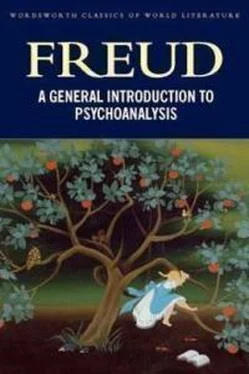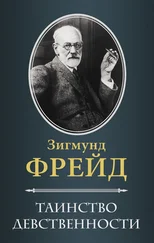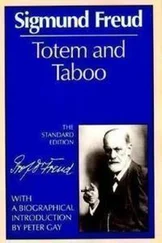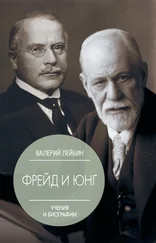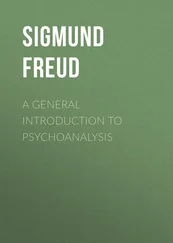We have pointed out that such a crippling of the ability to recall is characteristic of hysteria. In hysteria symptomatic conditions also arise (hysterical attacks) which need leave no trace in the memory. If these things do not occur in compulsion–neuroses, you are justified in concluding that these amnesias exhibit psychological characteristics of the hysterical change, and not a general trait of the neuroses. The significance of this difference will be more closely limited by the following observations. We have combined two things as the meaning of a symptom, its "whence," on the one hand, and its "whither" or "why," on the other. By these we mean to indicate the impressions and experiences whence the symptom arises, and the purpose the symptom serves. The "whence" of a symptom is traced back to impressions which have come from without, which have therefore necessarily been conscious at some time, but which may have sunk into the unconscious—that is, have been forgotten. The "why" of the symptom, its tendency, is in every case an endopsychic process, developed from within, which may or may not have become conscious at first, but could just as readily never have entered consciousness at all and have been unconscious from its inception. It is, after all, not so very significant that, as happens in the hysterias, amnesia has covered over the "whence" of the symptom, the experience upon which it is based; for it is the "why," the tendency of the symptom, which establishes its dependence on the unconscious, and indeed no less so in the compulsion neuroses than in hysteria. In both cases the "why" may have been unconscious from the very first.
By thus bringing into prominence the unconscious in psychic life, we have raised the most evil spirits of criticism against psychoanalysis. Do not be surprised at this, and do not believe that the opposition is directed only against the difficulties offered by the conception of the unconscious or against the relative inaccessibility of the experiences which represent it. I believe it comes from another source. Humanity, in the course of time, has had to endure from the hands of science two great outrages against its naive self–love. The first was when humanity discovered that our earth was not the center of the universe, but only a tiny speck in a world–system hardly conceivable in its magnitude. This is associated in our minds with the name "Copernicus," although Alexandrian science had taught much the same thing. The second occurred when biological research robbed man of his apparent superiority under special creation, and rebuked him with his descent from the animal kingdom, and his ineradicable animal nature. This re–valuation, under the influence of Charles Darwin, Wallace and their predecessors, was not accomplished without the most violent opposition of their contemporaries. But the third and most irritating insult is flung at the human mania of greatness by present–day psychological research, which wants to prove to the "I" that it is not even master in its own home, but is dependent upon the most scanty information concerning all that goes on unconsciously in its psychic life. We psychoanalysts were neither the first, nor the only ones to announce this admonition to look within ourselves. It appears that we are fated to represent it most insistently and to confirm it by means of empirical data which are of importance to every single person. This is the reason for the widespread revolt against our science, the omission of all considerations of academic urbanity, and emancipation of the opposition from all restraints of impartial logic. We were compelled to disturb the peace of the world, in addition, in another manner, of which you will soon come to know.
[39]There are fagots and fagots.
Nineteenth Lecture
General Theory of the Neuroses - Resistance and Suppression
In order to progress in our understanding of the neuroses, we need new experiences and we are about to obtain two. Both are very remarkable and were at the time of their discovery, very surprising. You are, of course, prepared for both from our discussions of the past semester.
In the first place: When we undertake to cure a patient, to free him from the symptoms of his malady, he confronts us with a vigorous, tenacious resistance that lasts during the whole time of the treatment. That is so peculiar a fact that we cannot expect much credence for it. The best thing is not to mention this fact to the patient's relatives, for they never think of it otherwise than as a subterfuge on our part in order to excuse the length or the failure of our treatment. The patient, moreover, produces all the phenomena of this resistance without even recognizing it as such; it is always a great advance to have brought him to the point of understanding this conception and reckoning with it. Just consider, this patient suffers from his symptoms and causes those about him to suffer with him. He is willing, moreover, to take upon himself so many sacrifices of time, money, effort and self–denial in order to be freed. And yet he struggles, in the very interests of his malady, against one who would help him. How improbable this assertion must sound! And yet it is so, and if we are reproached with its improbability, we need only answer that this fact is not without its analogies. Whoever goes to a dentist with an unbearable toothache may very well find himself thrusting away the dentist's arm when the man makes for his sick tooth with a pair of pincers.
The resistance which the patient shows is highly varied, exceedingly subtle, often difficult to recognize, Protean–like in its manifold changes of form. It means that the doctor must become suspicious and be constantly on his guard against the patient. In psychoanalytic therapy we make use, as you know, of that technique which is already familiar to you from the interpretation of dreams. We tell the patient that without further reflection he should put himself into a condition of calm self–observation and that he must then communicate whatever results this introspection gives him—feelings, thoughts, reminiscences, in the order in which they appear to his mind. At the same time, we warn him expressly against yielding to any motive which would induce him to choose or exclude any of his thoughts as they arise, in whatever way the motive may be couched and however it may excuse him from telling us the thought: "that is too unpleasant," or "too indiscreet" for him to tell; or "it is too unimportant," or "it does not belong here," "it is nonsensical." We impress upon him the fact that he must skim only across the surface of his consciousness and must drop the last vestige of a critical attitude toward that which he finds. We finally inform him that the result of the treatment and above all its length is dependent on the conscientiousness with which he follows this basic rule of the analytic technique. We know, in fact, from the technique of interpreting dreams, that of all the random notions which may occur, those against which such doubts are raised are invariably the ones to yield the material which leads to the uncovering of the unconscious.
The first reaction we call out by laying down this basic technical rule is that the patient directs his entire resistance against it. The patient tries in every way to escape its requirements. First he will declare that he cannot think of anything, then, that so much comes to his mind that it is impossible to seize on anything definite. Then we discover with no slight displeasure that he has yielded to this or that critical objection, for he betrays himself by the long pauses which he allows to occur in his speaking. He then confesses that he really cannot bring himself to this, that he is ashamed to; he prefers to let this motive get the upper hand over his promise. He may say that he did think of something but that it concerns someone else and is for that reason exempt. Or he says that what he just thought of is really too trivial, too stupid and too foolish. I surely could not have meant that he should take such thoughts into account. Thus it goes on, with untold variations, in the face of which we continually reiterate that "telling everything" really means telling everything.
Читать дальше
